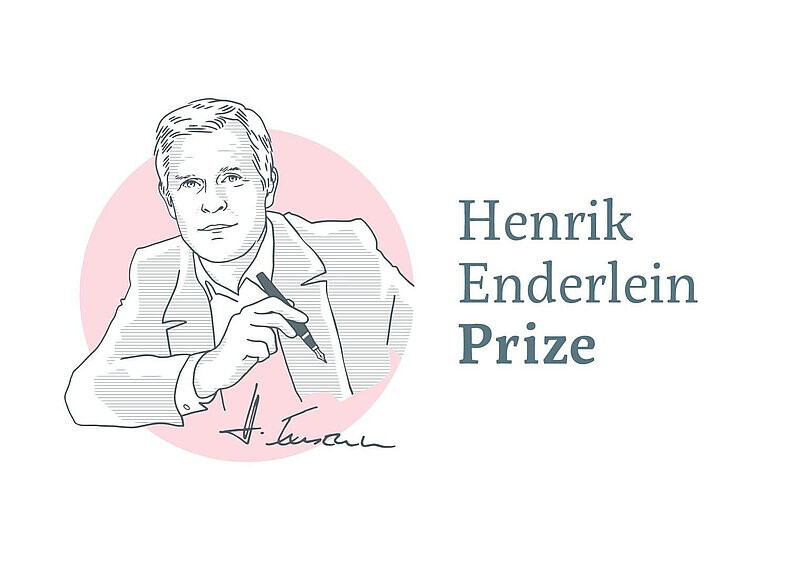Call for submissions: Henrik Enderlein Prize awarded for outstanding research on the future of Europe
The fourth Franco-German research prize will be given to exceptional scholars under 40 whose work contributes to solving the future challenges of Europe.
Berlin, 17 January 2025. European Union scholars are again invited to submit their works from the social sciences for the Henrik Enderlein Prize. The research prize in honour of the Hertie School’s late President is aimed at young researchers under 40 whose work exhibits scholarly excellence and a practical contribution to public debate on the future of Europe. It is endowed with 10,000 euros in total and was first awarded in 2022. Applications will be accepted until 28 February 2024. For more information on the submission process, please visit the Henrik Enderlein Prize webpage.
The Henrik Enderlein Prize is jointly awarded by the Hertie School, Sciences Po, the German Federal Foreign Office and the French Ministry for Europe and Foreign Affairs. The final winner will be chosen by an international Jury chaired by Hertie School President Cornelia Woll. This year’s winner will be recognised during a festive event in Paris this summer.
Past winners of the prize include political economist and sociologist Alexandros Kentikelenis (Bocconi University), political scientist Filip Kostelka (European University Institute) and legal scholar Vladislava Stoyanova (Lund University).
Showcasing the powerful impact of academic research
“We are proud to carry on this tradition in celebration of late Hertie School President Henrik Enderlein. Enderlein was an advocate for a strong, peaceful and forward-thinking Europe. By showcasing academic research that engages policymakers and civil society in Europe, we are honouring his legacy,” says Hertie School President Cornelia Woll.
International jury decides on the winner
A high-calibre nine-member jury chaired by Hertie School President Cornelia Woll will decide on the winner. Jury members include:
- Thierry Mayer, Professor of Economics at Sciences Po
- Dorit Geva, Professor of Politics and Gender at the University of Vienna
- Jakob Vogel, Professor of History at Sciences Po
- Christine Musselin, Vice President for Research at Sciences Po;
- Thurid Hustedt, Professor of Public Administration and Management and Dean of Graduate Programmes at the Hertie School
- Caroline Soder, Deputy Commissioner for Franco-German Cooperation at the French Ministry of Foreign Affairs
- Johanna Stilo, Deputy Commissioner for Franco-German Cooperation, German Federal Foreign Office
- Anja Wehler-Schöck, Member of the Editorial Board at Tagesspiegel
About the Hertie School
For 20 years, the Hertie School has been teaching, researching, and debating good governance and public affairs in the heart of Berlin and Europe. The social science university offers master's degrees, doctoral programmes, and executive education to train change-makers in government, business, and civil society. True to its motto "Understand today. Shape tomorrow." the university conducts interdisciplinary research, provides international and practice-oriented education, and serves as a forum for public debate. Six Centres of Competence strengthen its expertise in European affairs, international security, fundamental rights, sustainability, digital governance, and data science. The Hertie School was founded in 2004 by the non-profit Hertie Foundation and has been generously supported by it ever since. It is a member of the European university alliance CIVICA, publicly recognised, and accredited by the Accreditation Council as well as the German Council of Science and Humanities. www.hertie-school.org
About Sciences Po
Since 1872, Sciences Po's mission has been to shape free minds capable of understanding the world, in order to transform it. It places academic excellence and social inclusion at the heart of its values. Its unique academic objectives are defined by a multidisciplinary approach rooted in the humanities and social sciences, a strong international perspective, and the ability to combine fundamental knowledge with professional expertise thanks to its 280 permanent faculty members and 4,300 adjunct faculty.
A world-class research university with 11 research centers, Sciences Po takes social responsibility seriously, proposing solutions to major contemporary issues including environmental and digital transformations, changes in public policy, and the fight against inequality and discrimination. The defense of academic freedom – an essential condition for democracy and social progress – is also at the heart of our academic project.
Each year, Sciences Po trains 15,000 students, 50% of whom are international, on seven campuses (Dijon, Le Havre, Menton, Nancy, Paris, Poitiers, Reims) within the Undergraduate College, and in seven schools at Master's level (international affairs, public affairs, law, journalism, management, research, urban planning). 3,500 professionals also receive continued professional training.
Press contacts
Hertie School, Nick Cosburn
+49 (0) 30 259 219 – 226
pressoffice@hertie-school.org
Sciences Po, Katell Fagon
+33 (0) 1 45 49 50 79
media@sciencespo.fr
Auswärtiges Amt
+49 (0)30 5000 2056
presse@diplo.de
Ministère de l’Europe et des Affaires étrangères
+33 (0) 1 43 17 43 57
secretariat-presse.cabaeu@diplomatie.gouv.fr



